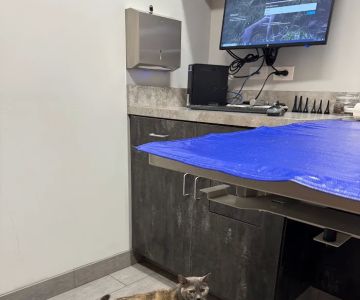What is a Veterinary Pharmacist? Understanding Their Role in Pet Healthcare
- What Does a Veterinary Pharmacist Do?
- Why Are Veterinary Pharmacists Important?
- How Veterinary Pharmacists Assist in Pet Care
- Career Path and Training for Veterinary Pharmacists
What Does a Veterinary Pharmacist Do?
When most people think of pharmacists, they often think of the individuals who dispense medications to humans at a pharmacy. However, veterinary pharmacists specialize in the medical needs of animals. A veterinary pharmacist plays a crucial role in ensuring that pets receive the right medications and treatments to improve their health. These professionals are experts in animal pharmaceuticals and work closely with veterinarians to provide the best possible care for pets.
As someone who has had firsthand experience with the complexities of administering medications to pets, I can tell you how invaluable a veterinary pharmacist is. Whether it’s ensuring the correct dosage of medication, explaining potential side effects, or helping you navigate the different forms of pet medicine (like liquids, capsules, or topical treatments), these specialists provide essential support for both pet owners and veterinary teams.
Why Are Veterinary Pharmacists Important?
Veterinary pharmacists play an important role in preventing medication errors, which can be detrimental to pets. Animals have different physiology compared to humans, and what works for one species may not be effective or safe for another. This is where a veterinary pharmacist's expertise comes in. They ensure that the medications prescribed by veterinarians are appropriate for the specific species, breed, and condition of the pet.
In my own experience with my dog’s chronic condition, I was constantly in touch with the veterinary pharmacist at the clinic. They made sure that my pet’s prescriptions were correctly adjusted based on their medical history, and they also took the time to explain how to administer the medication properly. This guidance not only ensured my dog’s safety but also gave me peace of mind as a pet owner.
How Veterinary Pharmacists Assist in Pet Care
Veterinary pharmacists are integral to managing the healthcare of pets in several ways:
1. Prescription Management and Medication Accuracy
Veterinary pharmacists help ensure that the medications prescribed to pets are accurate and appropriate for their condition. For example, when my cat was diagnosed with kidney disease, the veterinary pharmacist helped the vet choose the right medication to manage her condition. They also double-checked the dosage and potential drug interactions, which can be a common issue in pets with multiple health conditions.
2. Personalized Medication Advice
Pets have unique medical needs, and the medication that works for one pet may not be suitable for another. Veterinary pharmacists work closely with veterinarians to provide personalized medication recommendations based on each pet’s health, size, breed, and age. This is particularly important for animals with chronic conditions or those on long-term medication regimens, like my dog who has arthritis. The pharmacist always ensured that we had the correct dosage, helping him stay comfortable and pain-free.
3. Pet Medication Education for Owners
As a pet owner, administering medication to a pet can sometimes be challenging. A veterinary pharmacist educates owners on how to administer the medication properly, whether it’s through pills, injections, or topical treatments. The advice and support I received from the veterinary pharmacist were critical in making sure I understood how to properly give my cat her medication. Without their guidance, I might have made mistakes that could have been harmful to her.
Career Path and Training for Veterinary Pharmacists
To become a veterinary pharmacist, one must first obtain a Doctor of Pharmacy (Pharm.D.) degree, which typically takes about four years of post-graduate study. After completing the general pharmacy training, prospective veterinary pharmacists can pursue additional coursework or specialized internships in veterinary medicine to gain the necessary knowledge in animal health and pharmaceuticals.
The career path for a veterinary pharmacist is rewarding but requires a strong commitment to learning. Veterinary pharmacists often work in collaboration with veterinarians at animal hospitals, clinics, and pharmacies, where they provide crucial insights into medication choices and management. The training also involves understanding the specific needs of various animals, as well as how different medications interact with animal physiology.
Conclusion: The Value of a Veterinary Pharmacist in Pet Healthcare
Veterinary pharmacists are essential professionals who play an important role in ensuring that pets receive the best care possible. Whether it's providing critical medication management, offering expert advice, or educating pet owners on proper medication usage, these specialists significantly impact the health and well-being of pets. As pet owners, it’s important to recognize the invaluable contribution that veterinary pharmacists make to our pets' health.
If you're seeking guidance on managing your pet’s medications, I highly recommend consulting with a veterinary pharmacist. Their expertise can make a world of difference in how you manage your pet’s care, especially if your furry friend is dealing with a chronic condition or complex treatment plan.











